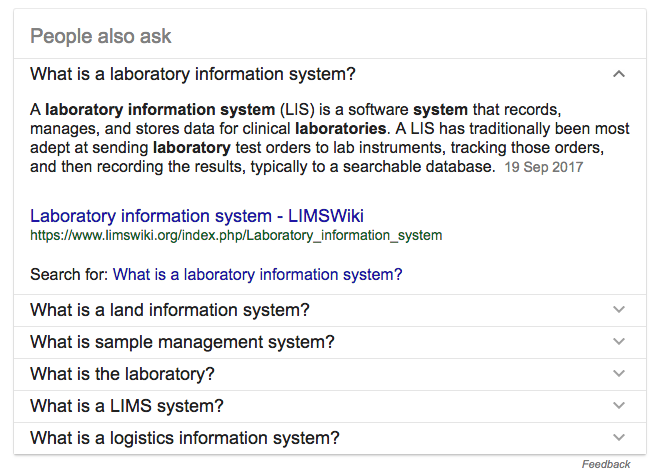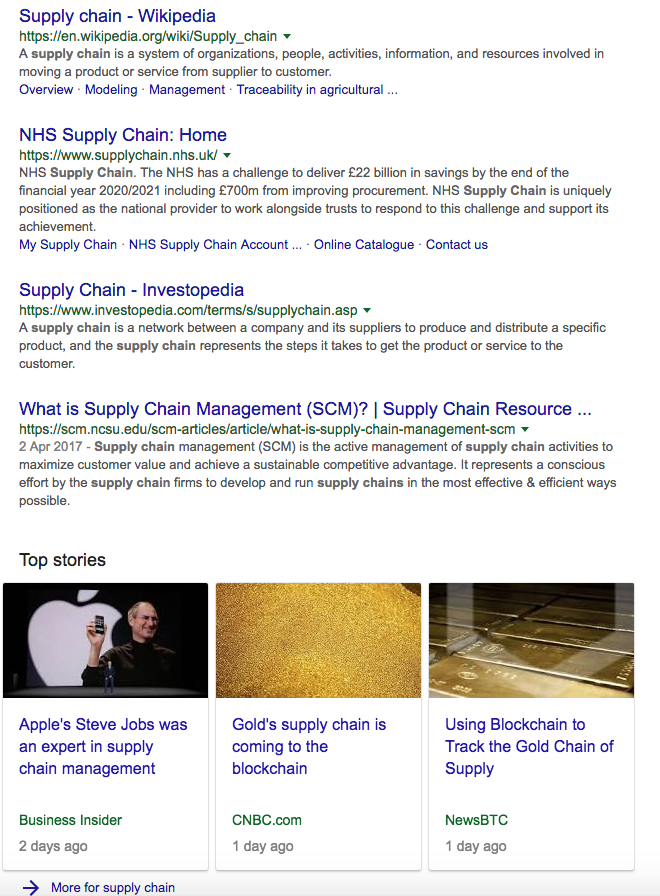Shrinking SERPs: should you worry?
Have you noticed your rankings improving, but your organic traffic flatlining? Or have you noticed paid traffic supplanting your organic?
You’re not alone, if so. According to the Wayfair SEO team, organic search has lost 25% of clickshare on desktop, and 55% on mobile. Wordstream, with a static organic search ranking, noticed a reduction of 37% between May 2015 and March 2017.
Worse, Google recently tested (and subsequently rolled back, as it always does) a new feature: the SERPS (search engine results pages) with NO organic search results. A bit like this, as noticed by David Gossage:

I’ll get to this later, it should not have come as a surprise.
So what’s actually happening here? There’s no one simple answer, so I’ll turn to the beauty of bullet points:
- Ads are bigger, better and more discreetly labelled – and there are more of them
- Four ads on mobile can be four swipes until you see organic results
- Google is answering questions directly, reducing the need for some organic results
- The way people are searching is changing
- Google is offering more featured search functionality
Let’s start at the start, with an outrageous claim…
Google wants you to click on the Ads
I’m no conspiracy theorist, but…
If I were Google, and my only source of revenue came through getting people to click on adverts, then I’d push my efforts at getting people to click on adverts.
Here’s a sample of some ads in 2015:

And now here’s a sample of the same search today:

The first, and most obvious change, is that the ads are less obviously ads.
Of course, by law Google has to state that these are paid-for search results – but the change can only have come about as a result of testing.
The second change is that the ads are obviously bigger. Even if, in this instance there are only two advertisers, they each have three lines, including callouts and snippets, as well as sitelinks. The second ad even includes a phone number.
The picture changes somewhat when we get to mobile:

The entire first page is taken up by one result, with a special offer, direct call, address, and four lines of actual ad copy.
This screenshot alone should help explain why mobile clickthrough rates to organic have dipped 55%.
And back round to my conspiracy theory – of course Google wants you to click on ads. Why else would they constantly be testing different ad formats and features? They’re not doing it to make things pretty.
If your search query is transactional, and you stand to make a profit from it, Google wants a cut.
It stands to reason, therefore, that the more transactional traffic going through organic, the more Google will seek to roll that back and push ads instead.
The Power of Knowledge (Panels)
The knowledge panel takes a few forms. For instance, if you want to know what the fastest animal in the world is, Google will tell you:

If you are interested in buying a Laboratory Information Management System (LIMS), then you would find this:

In the old days, we’d call this “scraping” – and Google still penalises sites that scrape content from others.
What’s the impact of this?
Well, Dr Pete is the SEO’s Oracle when it comes to testing. He did some work with Russ Jones and discovered the following:
- The average clickthrough on SERPs with just ten blue links is 79%
- Add a single knowledge card – with no other features – and the clickthrough drops to 25%.
That is enormous. A 68% drop-off in clickthrough.
This brings us round to Google’s recent test on no-organic search results. There are two sides to the argument, so let’s be fair and present both:
- This is not Google’s content: in order to reduce clickthrough to non-Google properties (i.e. your website), Google is stealing content and presenting it in a panel ahead of the search results. Theoretically, this answers the question, if it is a question.
- Do the organic search results add any value? Sometimes, they don’t. When you ask Google “what is the time?”, the only answer you want back is… the time. You don’t look at a watch for ten different opinions on what the time might be, do you?
So while some righteous anger is certainly due (because this does look like scraping, even if it is attributed), the latter is certainly the reason for Google’s testing of no-organic search results pages.
What’s more, searcher behaviour is changing, too.
People under 20 are much more likely to use voice search, and tend to use Google as an ‘assistant’. The best result is not always a search result. If you ask your Google Assistant the answer to 258 x 13, you don’t want it to send you ten blue links to your phone – you want the answer, as quickly as possible.
So… nuance. The numbers are alarming, but hold back the righteous anger, it’s quite likely that more people are using Google for answers that Google can provide directly, thereby providing a better experience.
Other search features
Your treasured number 1 position may find itself further pushed down the page with some of the below:
People Also Ask

This little tool is built on Google data – and the more you click, the more questions suddenly appear at the bottom, meaning it could be a never-ending click experience – without ever leaving Google.
Maps
You may have cornered the market in local search for your 20,000 different local pages (Interflora, I’m looking at you), but all that means nothing when you have Maps results dominating the page above organic:

A Knowledge Card
Search for information on when the legendary Jim Bowen was born, and you’ll get this:

An answer – but also a photo, a map, some alternative search results, as well as a drop-down for Events and Points of Interest.
You can’t help but feel for Wikipedia, by the way, who likely provided all of this information. Unless Google has built a database so comprehensive it includes Jim Bowen’s birthplace.
Side Panels
Search for Hilary Mantel, and you will get a real mixture of search results, with various meta data scraped from different parts of the web (mostly Wikipedia, natch), a list of her books (available on Google), social profiles and alternative searches.

Stories and In-Depth Articles
I often remind people that Google started out as an academic search engine, hence its reliance on citations. You still see examples of Google clinging to its academic past. Search for “Supply Chain”, and one of the top results is from NC State University.
This isn’t necessarily an organic search result. Spoiler: it’s an in-depth article that has been inserted into the organic search results.

That’s followed up by a list of ‘Top Stories’ from various news results, and the page also has a selection of other features:


What Google is doing here is throwing the kitchen sink at you. There is less reliance on websites providing the information via a click, and more reliance on websites providing the information so as to stop you from leaving Google.
And that’s not necessarily because Google is Evil, it’s because you - the user - want it.
The Direction of Travel – And What You Can Do
To those of us who don’t trust Google (most of us), the no-organic search results comes as no surprise. I’ve been predicting it for years (although to be fair, even a stopped clock is right twice a day).
This is, however, the direction of travel. A reduction – but not an elimination – of organic search, and an increase in two outcomes:
- More time spent on Google properties
- More money spent on ad clicks
Before the “SEO is Dead” brigade jump on board, organic search is the window to everything else. Without quality organic search results, people will turn to other search engines. The main reason we all use Google and not Bing is that Bing is utter rubbish. Imagine, however, if Bing were able to offer search results the equal of Google – providing utility and quality, we might use it more.
So if organic is the window to greater Google usage, we need to see it more as the window to greater brand visibility, and potentially loyalty. Over time, we may not be able to see organic as the window to transactional activity on our websites. The more money you make, the more Google wants a cut – therefore, the paid ads will take up more equity, and will be more subtle.
And the more people use their mobile phones, the more transactional they will become:
- I want to buy something (Adwords)
- I want to find directions (Maps)
- I need to know the time (Google)
If you view paid and organic as separate entities, perhaps you should think again. After all, it’s just one page, and the mix between results is blurring. Who can say that you won’t have paid results mixed with organic? Who can say that you won’t soon have an option to pay for the knowledge panel?
So, the answer to whether or not you should worry about Shrinking SERPs is “perhaps not so much - yet”. Nuance.
